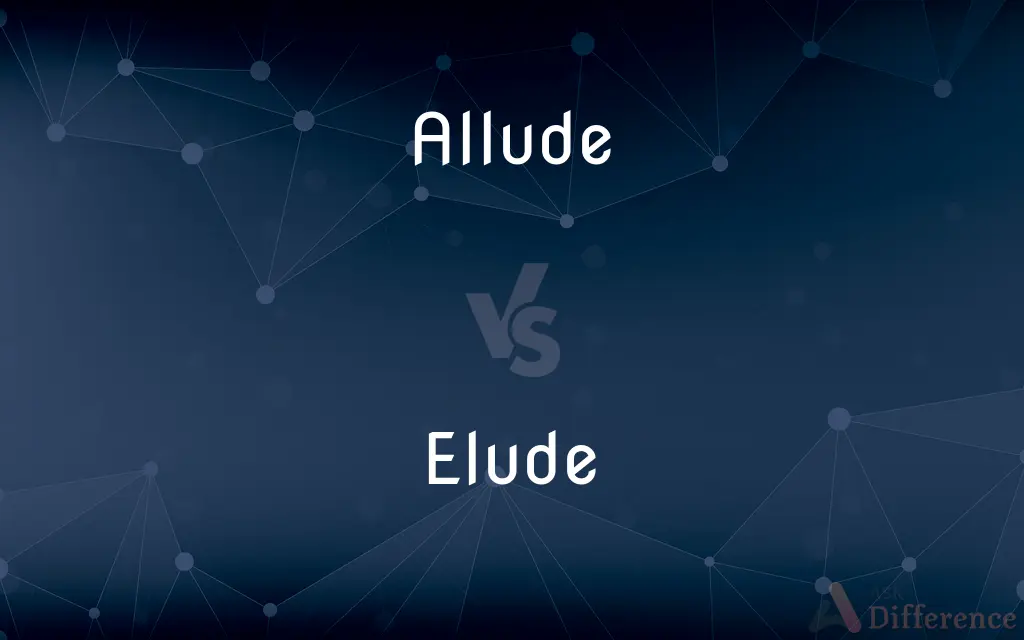Allude vs. Elude — What's the Difference?
By Tayyaba Rehman — Updated on October 5, 2023
Allude means to subtly reference, while elude means to evade or escape. Both words have distinct meanings and usage, involving indirect mention and avoidance, respectively.

Difference Between Allude and Elude
Table of Contents
ADVERTISEMENT
Key Differences
The words "Allude" and "Elude," despite their similar phonetic sound, carry different meanings and applications in the English language.
"Allude" is a verb that signifies the act of making an indirect reference or hint toward something, often in a subtle or metaphorical manner.
On the contrary, "Elude" denotes the action or state of avoiding or escaping from something, often representing an act of evasion.
A sentence with "Allude" might suggest a gentle or implicit reference to something without stating it directly, such as a writer alluding to a classic piece of literature in their work.
Conversely, "Elude" implies a failure or success in being caught, perceived, or understood, such as a criminal eluding the police or a concept eluding understanding.
ADVERTISEMENT
Comparison Chart
Meaning
To indirectly reference
To escape or avoid
Usage
Describing subtle references
Describing evasion
Example
Literary allusions
Evading capture
Typical Context
Writing, speaking
Physical or metaphorical escape
Antonyms
Specify
Confront
Compare with Definitions
Allude
Hinting without specifying
He alluded to a surprise in the speech.
Elude
Evading understanding
The solution continues to elude me.
Allude
Making a subtle reference
The novel alludes to mythological tales.
Elude
Avoiding deliberately
He somehow eludes all responsibility.
Allude
Vaguely pointing toward
The poet alluded to a personal tragedy.
Elude
Failing to be grasped
The logic of the theory eludes me.
Allude
Suggesting indirectly
She alluded to the problem without mentioning it.
Elude
Escaping physically
The thief managed to elude the police.
Allude
Implicitly mentioning
The movie alludes to historical events.
Elude
Escape from or avoid (a danger, enemy, or pursuer), typically in a skilful or cunning way
He tried to elude the security men by sneaking through a back door
Allude
Suggest or call attention to indirectly; hint at
She had a way of alluding to Jean but never saying her name
Elude
(of an achievement or something desired) fail to be attained by (someone)
Sleep still eluded her
Allude
To make an indirect reference
The candidate alluded to the recent war by saying, "We've all made sacrifices.".
Elude
To evade or escape from, as by daring, cleverness, or skill
The suspect eluded the police.
Allude
(intransitive) To refer to something indirectly or by suggestion.
Elude
To escape the memory or understanding of
A name that eludes me.
A point that eluded the audience.
Allude
To refer to something indirectly or by suggestion; to have reference to a subject not specifically and plainly mentioned; - followed by to; as, the story alludes to a recent transaction.
These speeches . . . do seem to allude unto such ministerial garments as were then in use.
Elude
To be unattained by
Another championship eluded her.
Allude
To compare allusively; to refer (something) as applicable.
Elude
(transitive) To evade or escape from (someone or something), especially by using cunning or skill.
Allude
Make a more or less disguised reference to;
He alluded to the problem but did not mention it
Elude
(transitive) To shake off (a pursuer); to give someone the slip.
Elude
(transitive) To escape being understandable to; to be incomprehensible to.
I get algebra, but calculus eludes me.
Elude
(transitive) To escape someone's memory, to slip someone's mind.
The solution of that brainteaser eludes me and the name of the author eludes my memory too.
Elude
To avoid slyly, by artifice, stratagem, or dexterity; to escape from in a covert manner; to mock by an unexpected escape; to baffle; as, to elude an officer; to elude detection, inquiry, search, comprehension; to elude the force of an argument or a blow.
Me gentle Delia beckons from the plain,Then, hid in shades, eludes he eager swain.
The transition from fetichism to polytheism seems a gradual process of which the stages elude close definition.
Elude
Escape, either physically or mentally;
The thief eluded the police
This difficult idea seems to evade her
The event evades explanation
Elude
Be incomprehensible to; escape understanding by;
What you are seeing in him eludes me
Elude
Avoid or try to avoid fulfilling, answering, or performing (duties, questions, or issues);
He dodged the issue
She skirted the problem
They tend to evade their responsibilities
He evaded the questions skillfully
Elude
Not being attained by
Victory continuously eluded the team.
Common Curiosities
Does “Allude” imply a direct mention?
No, "Allude" typically involves an indirect or subtle reference.
Is “Elude” used only in a criminal context?
No, “Elude” can be used to describe any form of evasion, physical or conceptual.
Is "Allude" used in a physical context?
Rarely, "Allude" is typically used to describe indirect verbal or written references.
Does “Elude” always imply a successful escape?
Not necessarily. One can attempt to elude without being successful.
Does “Elude” always imply intentional avoidance?
Not always, things can elude understanding or capture unintentionally.
Can "Allude" imply a hint?
Yes, "Allude" can signify a hint or implicit mention of something.
Can "Allude" be overt?
Typically no, "Allude" implies a degree of subtlety or indirectness.
Can “Elude” imply a mental state?
Yes, "Elude" can imply a failure to understand or grasp mentally.
Can "Allude" refer to positive references?
Yes, "Allude" is neutral and can point to positive or negative references.
Can "Allude" mean to pay tribute?
Indirectly, as one may allude to someone’s work as a form of homage.
Can you elude something accidentally?
Yes, it’s possible to accidentally elude something without intention.
Can something elude you if you’re not pursuing it?
Yes, something might elude understanding or notice without active pursuit.
Is "Allude" formal?
"Allude" can be used in both formal and informal contexts.
Can a concept elude someone?
Yes, when something is difficult to understand, it can be said to elude.
Is "Allude" synonymous with "Refer"?
Not exactly, as "Allude" suggests a more indirect or subtle reference than "Refer."
Share Your Discovery

Previous Comparison
Sheetrock vs. Drywall
Next Comparison
Identify vs. NameAuthor Spotlight
Written by
Tayyaba RehmanTayyaba Rehman is a distinguished writer, currently serving as a primary contributor to askdifference.com. As a researcher in semantics and etymology, Tayyaba's passion for the complexity of languages and their distinctions has found a perfect home on the platform. Tayyaba delves into the intricacies of language, distinguishing between commonly confused words and phrases, thereby providing clarity for readers worldwide.














































